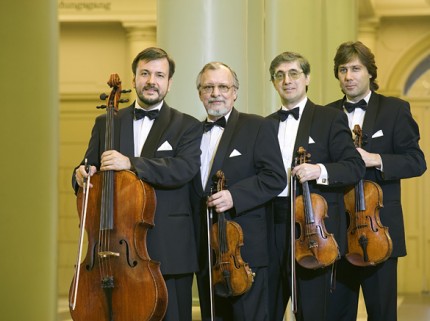Borodin Quartet makes admirable debut at Mandel Hall

Few ensembles can boast the kind of storied history of the Borodin Quartet. Founded in 1945 as the Moscow Philharmonic String Quartet, the group changed its name a decade later and soon became one of the world’s leading chamber groups, particularly noted for its advocacy of its compatriot composers.
The Borodin Quartet made its belated Mandel Hall debut Friday night in an all-Russian program designed to show off its feted bona fides in homegrown repertoire.
Now in its 65th year, the quartet’s original members are long gone, of course, but the current Borodin members are clearly continuing the national tradition in admirable style. The group is dominated by first violinist Ruben Aharonian whose sweet, gleaming sound is anchored at the low end by the remarkably fluent and rich-toned cellist Vladimir Balshin. The inner voices, second violinist Sergei Lomovsky and violist Igor Naidin, are less distinctive individually but form a cohesive ensemble.
One would expect the group to do well in music of their composer namesake and Alexander Borodin’s String Quartet No. 2 made a worthy curtain-raiser. An old-fashioned work in the best sense of the word, Borodin’s quartet is not entirely successful with an awkward final movement that doesn’t quite cohere with the melodic richness of the preceding sections. Still, the musicians made a fine case for Borodin’s lyrical music, with Balshin’s judicious vibrato deftly skirting schmaltz in the famous Notturno.
The musicians also showed themselves in synch with the spiky 20th-cenrtury acerbities of Stravinsky’s Concertino with the enigmatic coda nicely rendered.
Over its decades, the Borodin Quartet established a close relationship with Dmitri Shostakovich, second only to the Beethoven Quartet for whom the composer wrote most of his works in the genre. Still, considering that historical tradition, the Borodin Quartet’s performances of two Shostakovich works proved surprisingly uneven Friday night.
The First String Quartet came off best. This is a light-hearted work –by Shostakovich’s standard– in which the national lineage from Tchaikovsky is clear, and the Borodin players brought out the wry humor and bristling energy of the work.
Shostakovich String Quartet No. 9 is a work of his full maturity in the genre, with the writing becoming ever more spare and inward-looking with extended solo lines that seem on the point of despair.
The Borodin Quartet delivered a strong and mostly well played performance of this bleak, dark-textured music with cellist Balshin bringing full fervor to his solo in the final movement. But too much of the performance seemed almost offhand for such deeply felt music. Compared to the knife-edged intensity and blistering virtuosity of the Pacifica Quartet in ths work last January — part of their complete Shostakovich cycle — the Russians seemed less insightful and committed than their young American colleagues.
Note that the Pacifica Quartet — ensemble-in-residence at the University of Chicago — will reprise Shostakovich’s Quartet No. 3 alongside works of Schnittke and Miaskovsky 3 p.m. Oct. 30 at Mandel Hall.
Posted in Performances





Posted Oct 23, 2011 at 9:47 pm by Bozidar Sicel
I have to admit that I strongly disagree with the reviewer’s view of firs violinist of Borodin Quartet. Review says that “the group is dominated by first violinist Ruben Aharonian whose sweet, gleaming sound ….”. First of all in case of string quartet the least desirable quality is to “dominate the group”. And although the reviewer is right when he describes first violin’s playing as such that dominated, in my most humbled opinion it is just the way to destroy coherence and unity of the sound and not the quality at all. I got the feeling that Ruben Aharonian didn’t listen to his colleges but played tunes that let them down. About his sound, I found it abrasive, harsh, to loud and mostly annoying. Despite my best effort, I couldn’t fine even the trace of sweetness in Aharonian’s sound. What i pity! He put down his colleges among whom the most impressive was cellist Vladimir Balshin with his richness of tone, musicality and admirable feeling for team work. Violist was close to the level of cellist’s playing and second violin was almost impossible to hear of the over the top sound of Borodin’s leader.